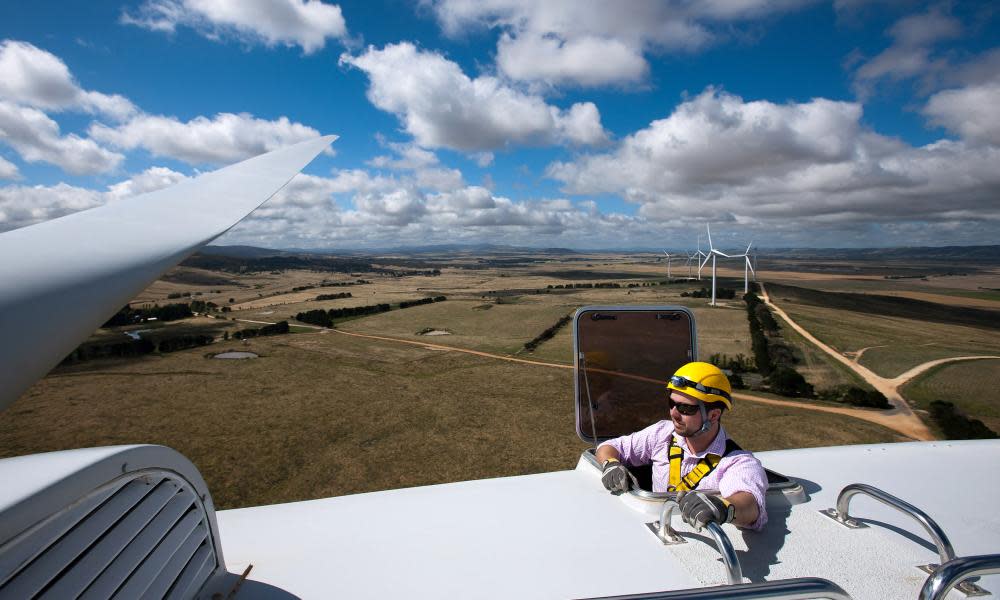Australia failing to meet Paris targets and more renewables needed, report says

With the Coalition still hamstrung by internal divide over a clean energy target, a new report shows Australia is in danger of not meeting its Paris agreement commitments unless it acts soon.
A report by the Australia Institute’s climate and energy program examined the government’s own modelling of the nation’s greenhouse gas emission reduction targets and found Australia could either transition to a 66-75% renewable energy target by 2030 to meet its commitments, or push the responsibility on to other sectors, such as agriculture or manufacturing.
While focusing on the energy sector would be the easiest way for Australia to meet its Paris responsibilities, made under the Abbott government, the executive director of the Australia Institute, Ben Oquist, said the current debate could see the nation head down a more difficult path.
In what he now says was an “aspirational” move, Abbott committed Australia to an emissions reduction target of 26-28% in 2015, shortly before he was replaced as prime minister.
Last week, Abbott hinted he was also prevented from further lowering the nation’s renewable energy target by his party, which his then environment minister, Greg Hunt, disputed on Sunday, and announced he could not support any further investment in renewable energy, exercising members of the backbench to follow suit.
Oquist said the analysis showed that, regardless of the politics, action was needed.
“While political uncertainty continues to shroud energy policy, this new modelling analysis shows higher levels of renewables will be needed if Australia is to meet the Paris targets in an economically efficient manner,” he told Guardian Australia.
“Regardless, Australia’s 26-28% emissions targets will have to be lifted in the future if Australia is to meet its obligations to help avoid the 1.5-2 degrees of global warming agreed to in Paris .
“The reality is that the electricity sector will have to ‘go faster’ in reducing emissions than other sectors of the economy.
“Outside the electricity arena abatement is more expensive and the technical and political complexities are greater.”
The institute’s analysis showed the easiest path was to reform the energy sector, as it had “available and cost effective options” in the form of renewables to turn to, while other sectors, such as Australia’s leading export industries, agriculture and manufacturing, did not.
“The good news is that renewables are now driving down prices and more renewables in the future will lead to even lower costs,” Oquist said. “With a combination of a ‘smarter’ grid, storage and demand management, much higher levels of renewable penetration can be achieved with strong reliability and in a more cost-effective way than a coal-dominated system.”
Abbott is urging the government to adopt his “reliable energy target” as he agitates for an abandonment of clean energy targets, claiming “green religion” had trumped “common sense” with energy policy over the last 15 years.
Malcolm Turnbull is yet to act on the central recommendation of the Finkel review, a 28% emissions reduction target, with the Coalition internally divided on how best to move forward.
An earlier analysis by the Australian Conservation Foundation showed the Finkel target did not go far enough to meeting Australia’s Paris commitment, with the goal to limit global warming to two degrees this century.
The government has been locked in a battle with AGL over its plans to close the aging coal-fired Liddell power station in 2022, with Turnbull and the energy minister, Josh Frydenberg, urging the company to keep it open, or sell to someone who will, in order to keep its power in the grid.
Turnbull has also floated the idea of using the Northern Australia Infrastructure Fund to build a new coal-fired power station in northern Queensland.
But he has refused to submit to Abbott’s demands the Coalition move away from renewables, repeatedly saying they remain “part of the mix” and criticising those who want to “dumb down” the debate into renewables versus coal.
But the issue promises to continue to dominate the agenda, as the Turnbull government attempts to finalise a new investment framework for energy, with a clean energy target being contemplated as part of that, although it has made clear it will not adopt the Finkel target.

 Yahoo News
Yahoo News 
